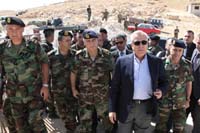 Lebanese President Michel Suleiman called on Hezbollah’s leader to withdraw his fighters from Syria in order not to further implicate Lebanon in the ongoing violence raging in the neighboring country.
Lebanese President Michel Suleiman called on Hezbollah’s leader to withdraw his fighters from Syria in order not to further implicate Lebanon in the ongoing violence raging in the neighboring country.
“We do not want the Resistance involved in the Golan [Heights] or [the rest of] Syria,” Suleiman told Future TV in an interview on Wednesday.
“I hope that Hezbollah Secretary General Sayyed Hassan Nasrallah would… bring the Resistance back to Lebanon because it is not [meant] for Syria,” the president added.
“The army-people-resistance equation should prevent Hezbollah from getting involved in Syria’s war. The resistance should go back to being protected by the state.” He stressed
Earlier in May, Hezbollah’s leader said that his group would receive advanced weaponry from Syria and support the “liberation of the Israeli-occupied Golan Heights.”
He also vowed in another speech on Saturday that his party and the Syrian regime would emerge victorious in the fighting in Syria after the Shiite party had pressed a military campaign against the rebel-held city of Al-Qusayr near the Lebanese border.
Meanwhile, Syrian rebel fighters have raised their rhetoric against Hezbollah, while Free Syrian Army Chief-of-Staff Major General Selim Idriss on Tuesday gave President Michel Suleiman a 24-hour ultimatum to get Hezbollah to withdraw its militants from Syria.
The United States also demanded the immediate withdrawal of Lebanese Hezbollah fighters from Syria earlier on Wednesday, saying their active role in combat there was an “extremely dangerous escalation.”
However, Suleiman highlighted that he is on good terms with Syrian President Bashar al-Assad and stressed that he did not stab him in the back.
“Assad is my friend and I am proud of this friendship. I was hoping [however] to see a democratic Syria [under his rule].”
Elsewhere, the head of state tackled the issue of extending the term of Lebanon’s parliament, reiterating his refusal of this decision.
“I will appeal the extension before the Constitutional Council… if it exceeded six months and did not have clear reasons [behind it],” Suleiman said.
“Agreement [between the politicians] on the extension is not enough for it to be constitutional,” the president noted.
However, he explained that he would not oppose extending the parliament’s mandate for a short period of time “in order to give more time for discussions on the electoral laws… But if the alternative is a lengthy extension, then I will favor holding the elections on June 16.”
“Staging the elections remains better that not holding them [at all],” he said.
As talks over a new electoral law ground to a halt earlier in May, Lebanon’s politicians turned to the issue of extending the parliament’s mandate in an attempt to delay the holding of the elections on June 16.
Speaker Nabih Berri has called for a plenary session on Friday to vote on extending the parliament’s mandate after the cabinet had approved on Monday the formation of electoral bodies for the vote. Candidates from most parties had registered their candidacies, setting the stage for the elections to be held under the 1960 law unless the parliament extends its term.
Arsal
Commenting on his visit to the Bekaa town of Arsal ( pictured with army chief Jean Kahawaji and other officers in Arsal) , the president said that he singled this incident out because it differs from the ongoing clashes in (the northern city of)Tripoli and from rockets falling on the Hermel region.
“A checkpoint was attacked in Arsal and it reminds us of the terrorism of Nahr al-Bared,” he stressed, in reference to the war between the army and the Islamist Fatah al-Islam forces that took place in the summer of 2007 in Tripoli’s Palestinian refugees camp in Trip.
Armed men opened fire on a military checkpoint near Arsal , killing three soldiers before escaping across the border into Syria, according to a Lebanese military source.
NOW
Leave a Reply
You must be logged in to post a comment.